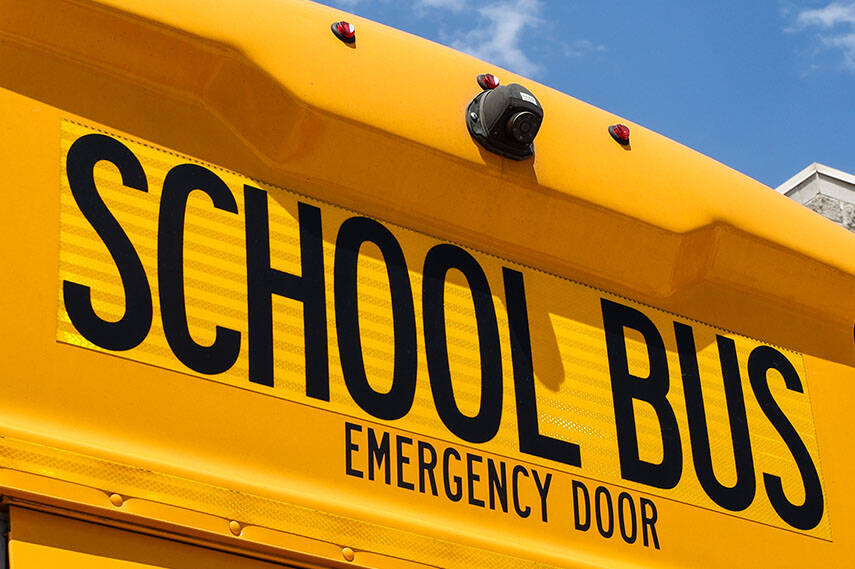CCSD details new safety measures for upcoming school year

Clark County School District leaders on Thursday delivered their last school safety update before the start of the school year and provided a refresher on the safety enhancements that students and staff will see as they return to classes next month.
Those enhancements include an instant alert system, which the district already has begun piloting at several schools; new fencing; a different flow of traffic as schools are reorganized around a single point of entry; upgraded cameras on buses and increased police presence at schools.
The announcement comes after the district, the fifth-largest in the country, experienced a spate of violence at its schools last year as students returned to their first full year of in-person instruction since the start of the pandemic.
The series of violent acts culminated in the brutal beating and sexual assault of an Eldorado High School teacher in April.
The attack prompted the district to unveil new safety measures, including increased police presence in and around schools and an instant alert system for teachers and staff to call for help to their location or trigger a campuswide emergency lockdown.
School police Chief Mike Blackeye said Thursday that the last school year was the department’s busiest year “in certain categories.” It included an uptick in fighting, and students filming fights and posting them to social media.
“That was a huge trend coming out of the pandemic where social media was their life,” he said.
What students and staff can expect
The first day of classes for the 2022-2023 school year will be Aug. 8.
As students and staff return, they’ll see new fences around their schools and a different flow of traffic as schools are reorganized around a single point of entry, according to the district’s chief of facilities, Nathan Miller.
Single-point-of-entry mechanisms will look different from school to school. Some schools in the district, like Arbor View High School, have open layouts with multiple points of entry that will need to be modified.
The district also is working to enhance its security camera systems to 4K security cameras, which produce sharper images than high-definition video.
Many schools already have some or all of these safety measures in place, but Miller said the district would not identify which schools had implemented which safety measures.
“Although some changes will be obvious to the public, we don’t want to provide those with ill intentions information they could use to do harm,” he said.
Some students and staff also will see an instant alert system that was rolled out in June at nine schools in response to the spike in campus violence last year.
The alert system consists of a badge that is worn by staff. When a button on the badge is pressed, it can trigger a campuswide emergency lockdown or initiate a staff alert that will call for immediate help from the school principal, nurse or school resource officer to the employee’s location.
The high schools where the alarms already have been installed and distributed are Basic, Centennial, Cheyenne, Clark, Del Sol, Durango, Liberty, Mojave and Palo Verde.
Positive feedback for new alert system
Chris Batterman, the district’s emergency management coordinator, said students and staff had positive feedback for the instant alert pilot, saying the badges were easy to wear and that they received the expected support when the buttons were pressed.
Batterman said the district solicited feedback from students and staff but didn’t hear any negative comments about the badges.
“If they hate it, they’re not going to utilize it,” Batterman said. “When you put this much money towards an instant alert, I want to know what the issues are.”
The instant alert systems will cost $11,000 per school and are being paid for with federal COVID-19 relief funds.
Superintendent Jesus Jara said the district was excited by the progress shown during the pilot program, and the district will recommend that the instant alert system be implemented throughout the entire school community at its board meeting on Aug. 11.
Cameras on school buses also will be upgraded to allow for real-time surveillance capabilities, according to Jennifer Vobis, the district’s director of transportation. Four cameras will be posted on the outside of each bus: one camera on the dashboard looking out and four cameras looking inside the bus.
The new camera systems will cost about $6 million, and bond funds will be used to pay for them.
All buses in the district have cameras, but approximately 60 percent of the nearly 2,000 buses had been upgraded with the new systems as of Thursday. The district expects every bus to have upgraded camera systems by the start of the spring semester.
Contact Lorraine Longhi at 702-387-5298 or llonghi@reviewjournal.com. Follow her @lolonghi on Twitter.